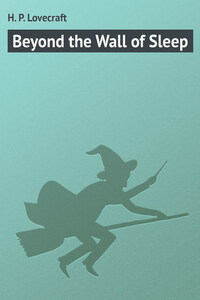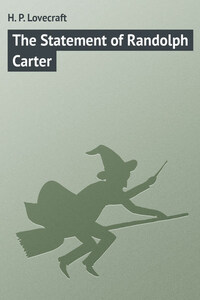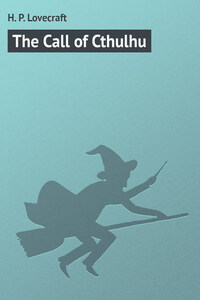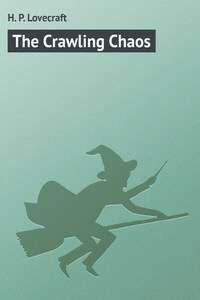"I have an exposition of sleep come upon me"
Shakespeare
I have frequently wondered if the majority of mankind ever pause to reflect upon the occasionally titanic significance of dreams, and of the obscure world to which they belong. Whilst the greater number of our nocturnal visions are perhaps no more than faint and fantastic reflections of our waking experiences – Freud to the contrary with his puerile symbolism – there are still a certain remainder whose immundane and ethereal character permit of no ordinary interpretation, and whose vaguely exciting and disquieting effect suggests possible minute glimpses into a sphere of mental existence no less important than physical life, yet separated from that life by an all but impassable barrier. From my experience I cannot doubt but that man, when lost to terrestrial consciousness, is indeed sojourning in another and uncorporeal life of far different nature from the life we know, and of which only the slightest and most indistinct memories linger after waking. From those blurred and fragmentary memories we may infer much, yet prove little. We may guess that in dreams life, matter, and vitality, as the earth knows such things, are not necessarily constant; and that time and space do not exist as our waking selves comprehend them. Sometimes I believe that this less material life is our truer life, and that our vain presence on the terraqueous globe is itself the secondary or merely virtual phenomenon.
It was from a youthful reverie filled with speculations of this sort that I arose one afternoon in the winter of 1900-01, when to the state psychopathic institution in which I served as an interne was brought the man whose case has ever since haunted me so unceasingly. His name, as given on the records, was Joe Slater, or Slaader, and his appearance was that of the typical denizen of the Catskill Mountain region; one of those strange, repellent scions of a primitive Colonial peasant stock whose isolation for nearly three centuries in the hilly fastnesses of a little-traveled countryside has caused them to sink to a kind of barbaric degeneracy, rather than advance with their more fortunately placed brethren of the thickly settled districts. Among these odd folk, who correspond exactly to the decadent element of “white trash” in the South, law and morals are non-existent; and their general mental status is probably below that of any other section of native American people.
Joe Slater, who came to the institution in the vigilant custody of four state policemen, and who was described as a highly dangerous character, certainly presented no evidence of his perilous disposition when I first beheld him. Though well above the middle stature, and of somewhat brawny frame, he was given an absurd appearance of harmless stupidity by the pale, sleepy blueness of his small watery eyes, the scantiness of his neglected and never-shaven growth of yellow beard, and the listless drooping of his heavy nether lip. His age was unknown, since among his kind neither family records nor permanent family ties exist; but from the baldness of his head in front, and from the decayed condition of his teeth, the head surgeon wrote him down as a man of about forty.
From the medical and court documents we learned all that could be gathered of his case: this man, a vagabond, hunter and trapper, had always been strange in the eyes of his primitive associates. He had habitually slept at night beyond the ordinary time, and upon waking would often talk of unknown things in a manner so bizarre as to inspire fear even in the hearts of an unimaginative populace. Not that his form of language was at all unusual, for he never spoke save in the debased patois of his environment; but the tone and tenor of his utterances were of such mysterious wildness, that none might listen without apprehension. He himself was generally as terrified and baffled as his auditors, and within an hour after awakening would forget all that he had said, or at least all that had caused him to say what he did; relapsing into a bovine, half-amiable normality like that of the other hill-dwellers.
As Slater grew older, it appeared, his matutinal aberrations had gradually increased in frequency and violence; till about a month before his arrival at the institution had occurred the shocking tragedy which caused his arrest by the authorities. One day near noon, after a profound sleep begun in a whiskey debauch at about five of the previous afternoon, the man had roused himself most suddenly, with ululations so horrible and unearthly that they brought several neighbors to his cabin – a filthy sty where he dwelt with a family as indescribable as himself. Rushing out into the snow, he had flung his arms aloft and commenced a series of leaps directly upward in the air; the while shouting his determination to reach some “big, big cabin with brightness in the roof and walls and floor and the loud queer music far away”. As two men of moderate size sought to restrain him, he had struggled with maniacal force and fury, screaming of his desire and need to find and kill a certain “thing that shines and shakes and laughs”. At length, after temporarily felling one of his detainers with a sudden blow, he had flung himself upon the other in a demoniac ecstasy of blood-thirstiness, shrieking fiendishly that he would “jump high in the air and burn his way through anything that stopped him”.
Family and neighbors had now fled in a panic, and when the more courageous of them returned, Slater was gone, leaving behind an unrecognizable pulp-like thing that had been a living man but an hour before. None of the mountaineers had dared to pursue him, and it is likely that they would have welcomed his death from the cold; but when several mornings later they heard his screams from a distant ravine they realized that he had somehow managed to survive, and that his removal in one way or another would be necessary. Then had followed an armed searching-party, whose purpose (whatever it may have been originally) became that of a sheriff’s posse after one of the seldom popular state troopers had by accident observed, then questioned, and finally joined the seekers.
Конец ознакомительного фрагмента. Полный текст доступен на www.litres.ru












